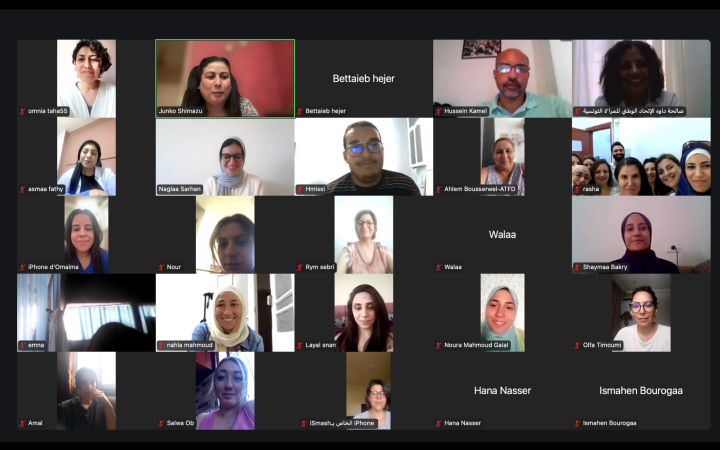- UNITAR launched the 5th cycle of its Gender Equality and Women’s Empowerment (GEWE) online training programme for the Middle East and North Africa (MENA) region on 30 June 2025.
- This training programme brings together approximately 40 young leaders and changemakers from local NGOs of Egypt, Sudan, Syria and Tunisia, offering an expanded learning experience on gender equality and women’s empowerment.
- The programme aims to foster a new generation of gender-responsive leaders capable of transforming institutions and policy landscapes in the region.
- All five cycles of the GEWE programme is made possible through the generous support of the Government of Cyprus.
2 July 2025, Hiroshima, Japan – On 30 June 2025, the United Nations Institute for Training and Research (UNITAR) launched the fifth cycle of its Gender Equality and Women’s Empowerment (GEWE) online training programme, “Gender Empowerment Now!”, for the Middle East and North Africa (MENA) region.
This training programme aims to foster a new generation of gender-responsive leaders capable of transforming institutions and policy landscapes in the region. This fifth cycle of the training programme brings together approximately 40 young leaders and changemakers selected from local NGOs from Egypt, Sudan, Syria, and Tunisia, offering an expanded learning experience on gender equality through online modules, interactive webinars, and online peer-to-peer engagement. The programme will culminate in the development of practical, action-oriented capstone projects aligned with national gender priorities. The programme is delivered in Arabic to respond to the needs of the participants in the MENA region, deepen understanding of the subject, and stimulate discussions.
All five cycles of the GEWE programme have been made possible through the generous support of the Government of Cyprus, reflecting their continued commitment to gender equality and sustainable development.
Online Opening Session
At the online opening session held on 30 June, representatives from UNITAR and the Government of Cyprus, as well as distinguished guests, offered words of encouragement to the participants.
We are proud to welcome participants from Egypt, Sudan, Syria, and Tunisia, each bringing diverse professional and personal experiences. This programme is not only an opportunity to deepen your individual knowledge and skills but is also a platform for building lasting regional networks. May this journey inspire you to lead positive transformation and contribute to building inclusive, gender-sensitive policies, institutions, and societies.
– Chisa Mikami, Head, Hiroshima Office, UNITAR
The promotion of women’s rights and gender equality is a priority for Government of Cyprus. We have enacted new laws to address these inequalities and established independent equality bodies to safeguard equal rights across all areas of public and private life. But achieving gender equality is not about ticking boxes. It is not a competition between men and women. It is a solution—one that addresses some of today’s biggest economic, social, and institutional challenges.
– Vivian Konnari, Government of Cyprus
Despite the critical role women play, they continue to face serious challenges—most notably exclusion from decision-making spaces and limited political and economic opportunities. This is especially true in light of the growing influence of religious authorities and armed factions. This training programme offers more than knowledge; it is a tool for empowerment and transformation. It enables us to strengthen our gender analysis, our advocacy, and above all, to create initiatives that speak directly to the lived realities of women in regions like Sweida.
– Walaa Al-Aqabani, Zhadur Organization, Syria
Programme Schedule
The training programme will run from June to September 2025 with a total of four interactive online sessions.
- Session 1 (30 June): Setting the Stage for Gender Equality and Effective Project Implementation
Opening session with remarks from guest speakers, overview of the programme, and insights on integrating gender perspectives into development initiatives. - Session 2 (30 July): Advancing Gender Equality Through Policy and Practice
The session will explore systemic barriers to gender equality, women’s leadership, and representation in decision-making through lectures, case studies, and best practices. - Session 3 (13 August): Effective Strategies for Project Implementation in Gender Programmes
The session will focus on project design fundamentals, real-world implementation challenges, and strategies for leveraging partnerships and funding opportunities. - Session 4 (1 September): Bridging Theory and Practice
The participants will present their capstone projects, receive feedback, and discuss lessons learned, scaling strategies, and future plans.
About the Gender Equality and Women’s Empowerment Programme (GEWE)
Since its launch in 2021, the Gender Equality and Women’s Empowerment (GEWE) programme, led by UNITAR’s Division of Prosperity, has continuously evolved to address the changing needs of the MENA region. Initially focused on building the capacities of government officials in countries such as Iraq, Jordan, and Lebanon, the programme has now broadened its reach to engage young civil society leaders and grassroots actors in Egypt, Sudan, Syria, and Tunisia.
Through the past successful cycles, GEWE has provided over 160 participants with the knowledge, skills, and collaborative networks needed to promote gender equality, design impactful initiatives, and foster institutional transformation. Core themes have included UNSCR 1325, gender mainstreaming in public policy, inclusive leadership, and multi-stakeholder engagement.
For more information: Gender Empowerment Now! Project
About UNITAR
The United Nations Institute for Training and Research (UNITAR) is a dedicated training arm of the United Nations. In 2024, UNITAR trained approximately 550,000 learners around the world to support their actions for a better future. UNITAR has a global presence, with offices in Geneva, Hiroshima, New York and Bonn and networks around the world. Find out more at www.unitar.org


